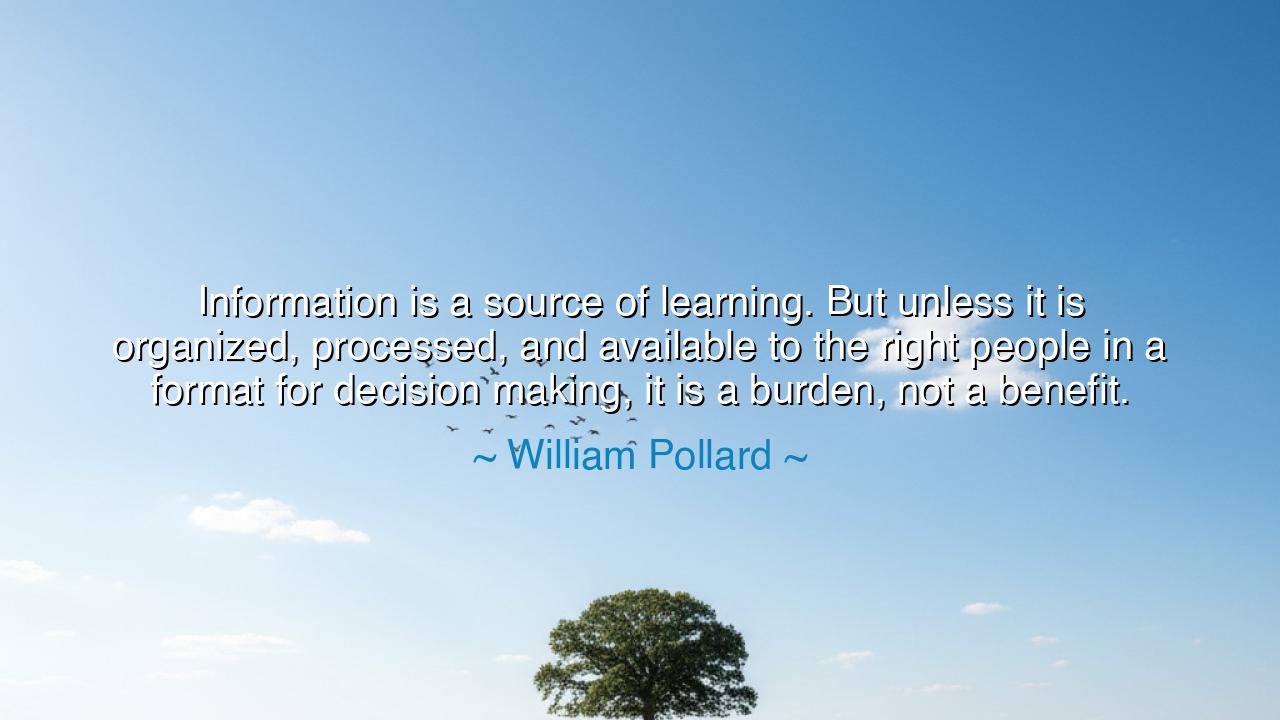
Information is a source of learning. But unless it is organized
Information is a source of learning. But unless it is organized, processed, and available to the right people in a format for decision making, it is a burden, not a benefit.






In the age of wisdom and invention, where men have gathered more knowledge than ever before, the words of William Pollard resound like a warning bell across the ages: “Information is a source of learning. But unless it is organized, processed, and available to the right people in a format for decision making, it is a burden, not a benefit.” These are not the words of a mere scholar, but of one who understood the great paradox of our time — that the abundance of knowledge can lead not to enlightenment, but to confusion. For information in itself is raw and chaotic, like a flood that nourishes yet also drowns, unless guided by the channels of wisdom.
In his saying, Pollard draws the line between information and understanding. Information is the gathering of facts, numbers, and data — fragments of truth scattered across the landscape of human experience. But learning is the transformation of those fragments into insight, the shaping of chaos into clarity. Without order, even the brightest knowledge blinds; without purpose, even the greatest library becomes a labyrinth. The ancients knew this well: the philosopher Aristotle once said that “educating the mind without educating the heart is no education at all.” So too, filling the mind with data without guiding it toward meaning is no true wisdom — it is merely clutter of the soul.
The origin of this wisdom lies in the timeless struggle between accumulation and application. In Pollard’s time — the twentieth century — the world was awakening to the power of computers, networks, and global communication. Information flowed faster than ever before, and yet, many became paralyzed by the sheer weight of it. He saw what many did not: that knowledge without structure is not strength, but weakness. A sword is forged not from metal alone, but from the shaping of it by skilled hands. Likewise, information becomes powerful only when shaped by discernment and used for the good of others.
The story of Alan Turing, the mathematician who helped decode the Enigma machine during World War II, reveals this truth vividly. The Allies had vast amounts of intercepted German communications — endless information — but it was useless until Turing and his team learned how to organize and process it. When they did, that same information became wisdom, and wisdom became victory. Thus, Pollard’s insight is eternal: data becomes power only when the mind gives it form and direction. Information unguided is noise; information mastered is salvation.
The ancients, too, wrestled with this truth. The Library of Alexandria, the greatest collection of knowledge in the ancient world, burned to ash — not because it lacked wisdom, but because humanity had not yet learned to preserve and apply it. It stood as a symbol of both triumph and tragedy: a monument to our hunger for knowledge and a warning of what happens when that hunger is not tempered by purpose. Pollard’s words are the modern echo of that ancient lesson — that true learning is not in the hoarding of facts, but in the refinement of understanding.
This wisdom also carries a moral weight. To hold information and not use it rightly is to waste the gift of learning. Leaders, teachers, and thinkers are entrusted not merely to collect knowledge, but to make it useful — to distill it, share it, and guide others with it. Information should serve humanity, not enslave it. A wise person does not seek to know everything, but to know what is necessary and to act upon it with integrity. In this way, information becomes not a burden, but a benefit — not a flood that destroys, but a river that sustains life.
Let this be the lesson passed down to all who seek truth in an age drowning in data: Do not mistake information for wisdom. Do not chase knowledge without purpose. Organize what you know; process it through reflection; share it with those who can use it for good. In a world filled with noise, be one who speaks with clarity. For in the end, it is not how much we know that defines us, but how wisely we use what we know. Information is a tool; wisdom is the craftsman’s hand. And only when the two work together can humanity truly learn, build, and rise.






AAdministratorAdministrator
Welcome, honored guests. Please leave a comment, we will respond soon